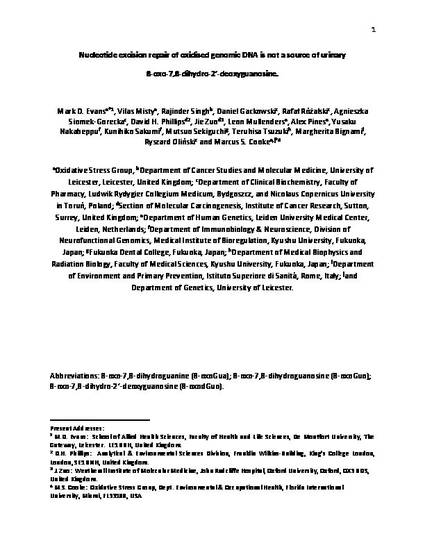
Urinary 8-oxo-7,8-dihydro-2'-deoxyguanosine (8-oxodGuo) is a widely measured biomarker of oxidative stress. It has been commonly assumed to be a product of DNA repair, and therefore reflective of DNA oxidation. However, the source of urinary 8-oxodGuo is not understood, although potential confounding contributions from cell turnover and diet have been ruled out. Clearly it is critical to understand the precise biological origins of this important biomarker, so that the target molecule that is oxidised can be identified, and the significance of its excretion can be interpreted fully. In the present study we aimed to assess the contributions of nucleotide excision repair (NER), by both the global genome NER (GG-NER) and transcription-coupled NER (TC-NER) pathways, and sanitisation of the dGTP pool (e.g. via the activity of the MTH1 protein), on the production of 8-oxodGuo, using selected genetically-modified mice. In xeroderma pigmentosum A (XPA) mice, in which GG-NER and TC-NER are both defective, the urinary 8-oxodGuo data were unequivocal in ruling out a contribution from NER. In line with the XPA data, the production of urinary 8-oxodGuo was not affected in the xeroderma pigmentosum C mice, specifically excluding a role of the GG-NER pathway. The bulk of the literature supports the mechanism that the NER proteins are responsible for removing damage to the transcribed strand of DNA via TC-NER, and on this basis we also examined Cockayne Syndrome mice, which have a functional loss of TC-NER. These mice showed no difference in urinary 8-oxodGuo excretion, compared to wild type, demonstrating that TC-NER does not contribute to urinary 8-oxodGuo levels. These findings call into question whether genomic DNA is the primary source of urinary 8-oxodGuo, which would largely exclude it as a biomarker of DNA oxidation. The urinary 8-oxodGuo levels from the MTH1 mice (both knock-out and hMTH1-Tg) were not significantly different to the wild-type mice. We suggest that these findings are due to redundancy in the process, and that other enzymes substitute for the lack of MTH1, however the present study cannot determine whether or not the 2'-deoxyribonucleotide pool is the source of urinary 8-oxodGuo. On the basis of the above, urinary 8-oxodGuo is most accurately defined as a non-invasive biomarker of oxidative stress, derived from oxidatively generated damage to 2'-deoxyguanosine.
Available at: http://works.bepress.com/marcus-cooke/5/

Post Print Version.
Originally published in Free Radical Biology and Medicine.